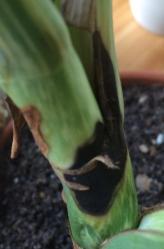Hello,
I purchased a rooted Variegated Monstera Deliciosa cutting on ebay and am very happy with my plant, however I just noticed a slightly sinister looking black area on one of the stems. It measures approx 1"x1.5". When I emailed the seller to ask what it could be, she suggested it was most probably something to do with the old leaf sheath and that it would fall away. However it looks to me to be a 'rot' of some kind as it's in the flesh of the main stem and also in the flesh of the new recently unfurled leaf which has grown from it. Directly on the back side of the blackened stem in is an aerial root (the only one on this cutting).
Please see attached photo. I am based in the UK and the plant will live indoors.
I would be so grateful for any clues as to what this might be please. Also should I worry for the health of my plant and the other plants in my home?
Many thanks
Sacha

